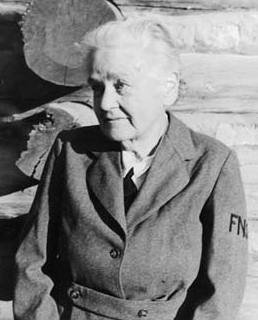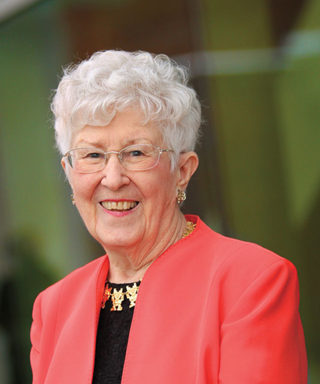Related Research Articles

Hildegard E. Peplau was an American nurse and the first published nursing theorist since Florence Nightingale. She created the middle-range nursing theory of interpersonal relations, which helped to revolutionize the scholarly work of nurses. As a primary contributor to mental health law reform, she led the way towards humane treatment of patients with behavior and personality disorders.
Pediatric nursing is part of the nursing profession, specifically revolving around the care of neonates and children up to adolescence. The word, pediatrics, comes from the Greek words 'paedia' (child) and 'iatrike' (physician). 'Paediatrics' is the British/Australian spelling, while 'pediatrics' is the American spelling.
Nurse education consists of the theoretical and practical training provided to nurses with the purpose to prepare them for their duties as nursing care professionals. This education is provided to student nurses by experienced nurses and other medical professionals who have qualified or experienced for educational tasks, traditionally in a type of professional school known as a nursing school. Most countries offer nurse education courses that can be relevant to general nursing or to specialized areas including mental health nursing, pediatric nursing and post-operatory nursing. Courses leading to autonomous registration as a nurse typically last four years. Nurse education also provides post-qualification courses in specialist subjects within nursing.
Psychiatric nursing or mental health nursing is the appointed position of a nurse that specialises in mental health, and cares for people of all ages experiencing mental illnesses or distress. These include: neurodevelopmental disorders, schizophrenia, schizoaffective disorder, mood disorders, addiction, anxiety disorders, personality disorders, eating disorders, suicidal thoughts, psychosis, paranoia, and self-harm.
Nursing assessment is the gathering of information about a patient's physiological, psychological, sociological, and spiritual status by a licensed Registered Nurse. Nursing assessment is the first step in the nursing process. A section of the nursing assessment may be delegated to certified nurses aides. Vitals and EKG's may be delegated to certified nurses aides or nursing techs. It differs from a medical diagnosis. In some instances, the nursing assessment is very broad in scope and in other cases it may focus on one body system or mental health. Nursing assessment is used to identify current and future patient care needs. It incorporates the recognition of normal versus abnormal body physiology. Prompt recognition of pertinent changes along with the skill of critical thinking allows the nurse to identify and prioritize appropriate interventions. An assessment format may already be in place to be used at specific facilities and in specific circumstances.
Nursing in the United Kingdom has a long history. The current form of nursing is often considered as beginning with Florence Nightingale who pioneered modern nursing. Nightingale initiated formal schools of nursing in the United Kingdom in the late 19th and early 20th centuries. The role and perception of nursing has dramatically changed from that of a handmaiden to the doctor to professionals in their own right. There are over 700,000 nurses in the United Kingdom and they work in a variety of settings, such as hospitals, health centres, nursing homes, hospices, communities, and academia, with most working for the National Health Service (NHS). Nurses work across all demographics and requirements of the public: adults, children, mental health, and learning disability. Nurses work in a range of specialties from the broad areas of medicine, surgery, theatres, and investigative sciences such as imaging. Nurses also work in large areas of sub-specialities such as respiratory, diabetes, neurology, infectious diseases, liver, research, cardiac, and stoma. Nurses often work in multi-disciplinary teams but increasingly are found working independently.
Dame Elizabeth Harriet Fradd, DBE, FRCN, is a British nursing administrator. Between 1973–1983, she held a variety of registered nurse, midwife and health visitor posts, while training as a children’s nurse who also managed children's units in Nottingham and worked as a nursing officer at the Department of Health.
Primary nursing is a system of nursing care delivery that emphasizes continuity of care and responsibility acceptance by having one registered nurse (RN), often teamed with a licensed practical nurse (LPN) and/or nursing assistant (NA), who together provide complete care for a group of patients throughout their stay in a hospital unit or department. While the patient is on the nurses' unit, the primary nurse accepts responsibility for administering some and coordinating all aspects of the patient's nursing care, with the support of other members of the nursing staff. This results in the nurse having greater insight into the patient's condition, both medical and emotional.

Mary Carson Breckinridge was an American nurse midwife and the founder of the Frontier Nursing Service (FNS), which provided comprehensive family medical care to the mountain people of rural Kentucky. FNS served remote and impoverished areas off the road and rail system but accessible by horseback. She modeled her services on European practices and sought to professionalize American nurse-midwives to practice autonomously in homes and decentralized clinics. Although Breckinridge's work demonstrated efficacy by dramatically reducing infant and maternal mortality in Appalachia, at a comparatively low cost, her model of nurse-midwifery never took root in the United States.

Nursing is a profession within the healthcare sector focused on the care of individuals, families, and communities so they may attain, maintain, or recover optimal health and quality of life. Nurses can be differentiated from other healthcare providers by their approach to patient care, training, and scope of practice. Nurses practice in many specialties with differing levels of prescription authority. Nurses comprise the largest component of most healthcare environments; but there is evidence of international shortages of qualified nurses. Nurses collaborate with other healthcare providers such as physicians, nurse practitioners, physical therapists, and psychologists. There is a distinction between nurses and nurse practitioners; in the U.S., the latter are nurses with a graduate degree in advanced practice nursing, and are permitted to prescribe medications unlike the former. They practice independently in a variety of settings in more than half of the United States. Since the postwar period, nurse education has undergone a process of diversification towards advanced and specialized credentials, and many of the traditional regulations and provider roles are changing.
Nursing in Japan did not develop as an occupation until the end of the nineteenth century. Initially introduced only in Tokyo in the late 1860s, small schools utilizing Western models were being opened by the late 1880s. In response to disaster relief, the Japanese Red Cross became an integral part of nursing development. By 1915, nurse registration had been established and public health nurses began working throughout the country. Nursing universities were established in the twentieth century and regulations were passed to develop standards for training and public health.
The timeline of nursing history in Australia and New Zealand stretches from the 19th century to the present.

Loretta C. Ford is an American nurse and the co-founder of the first nurse practitioner program. Along with pediatrician Henry Silver, Ford started the pediatric nurse practitioner program at the University of Colorado in 1965. In 1972, Ford joined the University of Rochester as founding dean of the nursing school.
The Platt Report, formerly known as the Welfare of Sick Children in Hospital , was a report that was the result of research into the welfare of children who were undergoing medical treatment within the UK and to make suggestions that could be passed on to the hospital authorities that would improve their welfare during hospital visits. The report was named after Sir Harry Platt, who was the President of the Royal College of Surgeons. Platt produced the report at the behest of the Ministry of Health in the UK government. The recommendations in the Platt Report, provided the means by which a child trauma ward of a hospital should be planned for children. Established on 12 June 1956, the committee that was to produce the report defined their remit as:
To make a special study of the arrangements made in hospitals for the welfare of ill children – as distinct from the medical and nursing treatment – and to make suggestions which could be passed on to hospital authorities.
Sir Alan William Craft is a British paediatric oncologist and Emeritus Professor of Child Health at Newcastle University. Craft was most notable for work as one of nine founders of the Children's Cancer Study Group, focusing his research on paediatric oncology, especially the epidemiology of bone tumours that further led to an oncology research unit which has been involved in aetiological studies and in particular the role of irradiation in the development of childhood cancer.
Sir David Michael Baldock Hall is a British paediatrician. Hall is most notable for publishing a paper with Dr Gillian Baird, on the role of primary care in identifying developmental problems in children that later resulted in the series of books being published called Health for all children that led in turn to one of the first attempts to apply an objective evidence based approach to medical practice for children. Hall is emeritus professor of community paediatrics at the Institute of General Practice and Primary Care, University of Sheffield.
Roberta Lynn Woodgate is a Canadian nurse. She is a Distinguished Professor and Tier 1 Canada Research Chair in Child and Family Engagement in Health Research and Healthcare at the University of Manitoba.
Faith Gibson is a British nurse who is Deputy Chief Nurse for Research, Nursing and Allied Health and Professor of Child Health and Cancer Care at Great Ormond Street Hospital. Her research investigates cancer care for children and young people. She was awarded the International Society of Paediatric Oncology Lifetime Achievement Award in 2018.
References
- ↑ "Rolls of honour: RCN Fellowships" (PDF). Royal College of Nursing. Retrieved 13 January 2011.[ permanent dead link ]
- ↑ Pandey, Rajkumar (2007). Nursing and Midwifery Education. Krishan Mittal for Mittal Publications. ISBN 81-8324-202-2.